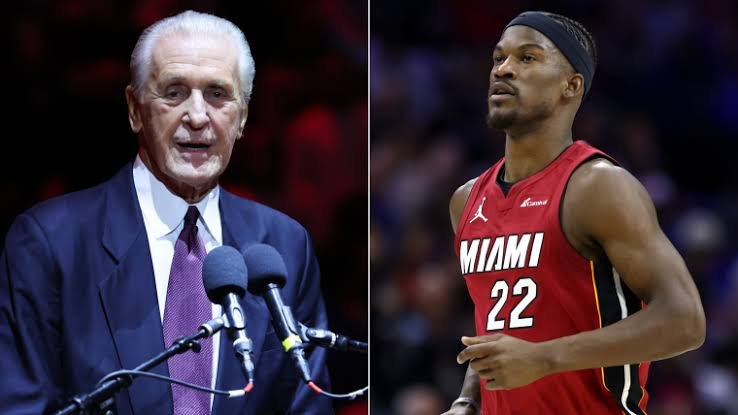**Pat Riley’s Discontent: The Implications of Jimmy Butler’s Comments and the Call for More Commitment**
In the dynamic world of the NBA, the interplay between players, coaches, and executives often makes headlines. Recently, Pat Riley, the esteemed president of the Miami Heat, found himself at the center of attention due to his reaction to remarks made by star player Jimmy Butler. Butler’s comments on the Boston Celtics and New York Knicks have stirred the pot, leading Riley to express his dissatisfaction publicly. This situation not only reflects the pressures of high-stakes basketball but also highlights the broader issues of team chemistry, leadership, and player commitment.
### The Controversial Comments
Jimmy Butler, known for his outspoken nature and competitive spirit, recently made headlines with his remarks about the Boston Celtics and New York Knicks. During an interview, Butler commented on the perceived strength and future prospects of these rival teams, expressing his opinions on their strategies and potential. While such comments might be seen as a typical player’s banter, they have significant implications in the context of team dynamics and management expectations.
Butler’s critique of the Celtics and Knicks seemed to reflect a broader frustration or dissatisfaction with the current state of affairs within the Eastern Conference. His remarks, though candid, touched on sensitive issues concerning the competitiveness of the Heat and the direction of their season. In a league where every word can be scrutinized and interpreted, Butler’s comments quickly became a topic of discussion among fans, analysts, and within the Heat’s own organization.
### Pat Riley’s Response
Pat Riley, a legendary figure in the NBA and a key architect of the Miami Heat’s success, did not take kindly to Butler’s remarks. Known for his meticulous approach and high standards, Riley’s reaction was somewhat expected given his role in maintaining team discipline and focus. In a series of statements, Riley expressed his discontent with Butler’s public comments, suggesting that they were not in line with the team’s objectives and expectations.
Riley’s discontent was multifaceted. On one hand, it reflected his concern that Butler’s comments might undermine team morale or create unnecessary distractions. On the other hand, it was also a clear signal of Riley’s commitment to holding players accountable for their actions both on and off the court. The implication of Riley’s remarks was clear: Butler needed to channel his energy and focus more on contributing to the team’s success rather than engaging in public commentary about rivals.
### The Implications for Team Dynamics
Riley’s response highlights the intricate balance that must be maintained within a professional sports team. In high-pressure environments like the NBA, maintaining a unified front is crucial for success. When a star player like Butler makes controversial statements, it can create ripples that affect team chemistry and public perception. Riley’s reaction serves as a reminder of the importance of maintaining discipline and focusing on collective goals rather than individual opinions or external rivalries.
The situation also underscores the delicate nature of leadership within a team. While Butler’s comments might be seen as a form of candid expression or competitive spirit, Riley’s response illustrates the necessity of aligning individual player behavior with the broader objectives of the team. Riley’s call for Butler to play more and focus on his performance rather than public statements reflects a fundamental principle in team sports: individual actions must contribute positively to the team’s success.
### The Broader Context
This situation is not an isolated incident but part of a broader narrative in professional sports where player statements and management responses often intersect. The NBA, with its high-profile players and intense media scrutiny, frequently sees such conflicts between individual expression and organizational expectations. Riley’s reaction to Butler’s comments is emblematic of the challenges faced by team leaders in navigating these complex dynamics.
Moreover, this incident sheds light on the broader theme of player accountability. In an era where social media and public statements play a significant role, players are often in the spotlight not just for their on-court performances but also for their off-court behavior. Riley’s response to Butler’s comments serves as a reminder that players must balance their individual perspectives with the responsibilities and expectations of their teams.
### Moving Forward
As the Miami Heat navigate the current season, the focus will inevitably shift back to performance on the court. For Jimmy Butler, the challenge will be to channel his energy into contributing positively to the team’s objectives. For Pat Riley and the Heat’s management, the task will be to ensure that such incidents do not disrupt team cohesion or detract from their competitive goals.
The situation between Riley and Butler also offers a valuable lesson in leadership and communication. Effective management in professional sports requires not only addressing public comments and behavior but also fostering an environment where players can thrive both individually and collectively. Riley’s handling of the situation will likely influence how such matters are addressed in the future, highlighting the importance of maintaining a balanced approach to player management and team dynamics.
In conclusion, the tension between Pat Riley and Jimmy Butler over recent comments provides a window into the complex interplay of personalities and expectations within professional sports. Riley’s dissatisfaction with Butler’s remarks reflects broader themes of team unity, leadership, and accountability. As the season progresses, the focus will return to the court, where the Heat’s success will ultimately be determined by their ability to overcome challenges and work together towards their collective goals.
